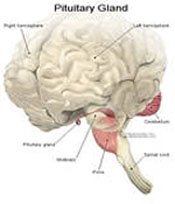CORTISOL LEVELS
Cortisol levels (hormones) are created in the adrenal cortex in response to the ACTH (adrenal cortical stimulating hormone) created in the pituitary gland.

One of the hormones produced is adrenaline which is increased for short term stress situations.
Another adrenal hormone, aldosterone, maintains the cortisol levels for these body functions: maintain internal fluid balance; regulate blood pressure; and regulate testosterone, estrogen, and DHEA levels.
Cortisol regulates blood sugar, energy production, controls inflammation, protects the immune system and promotes healing.
Cortisol is a key player for individuals who have an iodine deficiency. The lack of cortisol in your system prevents the absorption of thyroid hormones into the cells.
Cortisol levels increase or decrease according to the demands you place upon your body - whether its physical or psychological stress.
Overstimulation of the cortisols is often referred to as the "fight or flight hormone". When your adrenals are asked one time too many to respond to daily stressors, your adrenals can become fatigued.
Sleep deprivation is one of the early signs of adrenal fatigue This fatigue will leave you with cardiovascular problems, as well as improper utilization of fats, carbohydrates and proteins.
In severe cases, you may be diagnosed with Addison's Disease caused by chronic fatigue.
Stressors

Battling traffic, competing for parking spaces and watching the evening news produces the same physiological responses as running for your life.
Emotional stress, pregnancy and illness all contribute to an increase in cortisol. These levels may also increase due to hyperthyroidism or obesity.
Some drugs can increase your cortisol levels such as birth control contraceptives and synthetic coritol (Hydrocortisone).
All forms of stress - environment, hot, cold, noise, chemical pollution, or drugs produce the same consequences.
Physical stress such as trauma, infection, worry, fear, nutritional deficiencies are stressors. Worst of all, refined sugar consumption is the utimate stressor on the body. Hypothyroidism is closely associated with decreased cortisol.
Steroid hormones may also decrease your cortisol.
Stages of Exhaustion
Initially, there is the reaction: trauma, infection, heat, cold, chemical, irritation, etc. The endocrine system releases cortisol and other hormones to compensate for the trauma. Your heart beats faster, your blood pressure rises and your pupils dialate.
The next state is adaption: The adrenal glands become enlarged and release large quantities of adrenal cortical hormones. The initial symptoms disappear and your body provides you with a burst of energy so you are able to function with the stressors.
The third stage is exhaustion: After an extended period of time, your body's reserves become depleted and you are no longer able to withstand the continual barrage of the stressors.
At this point you may experience a total collapse, suffer a nervous breakdown, become dysfunctional and/or experience organ failure such as heart attack or stroke.
The fourth stage is death.
High Cortisol Levels

High cortisol levels increase abdominal fat which is difficult to shed. Symptoms may include weakness, excessive thirst, mood swings, bruising, depressed immune function, accelerated aging, and stomach ulcers.
If you have tried to diet to lose this weight, those plans quickly fall by the wayside simply because the weight loss plans are not addressing the underlying issue.
As a result, it is easy to fall back into the trap of eating the wrong types of foods and living a sedentary lifestyle.
It's a "catch 22" as excessive carbohydrates and junk food increase the imbalance of the hormones.
High Cortisol Solution
Your local health food store can provide you with a simple solution to this problem. Its called PS or Phosphatidyl Serine, a fatty acid normally found in muscles and the immune cells.
Janie A. Bowthorpe, author of Stop the Thyroid Madness: A Patient Revolution Against Decades of Inferior Treatment, reports this has been used successfully by improving the brain function and repairing damaged brains.
It effectively reduces high cortisol levels, stops muscles declination from high cortisol damage, and stimulates the immune response system.
Further research has also shown this to be a very successful treatment for Alzheimer's Disease.
According to Janie, there are different combinations sometimes used with this product, but she feels the simple physphatidyl serine with no added complex works well.
The recommended dose is from 300 mg. to 1000 mg. per day. Start at a lower dose and gradually increase the dosage until you obtain relief.
This should be taken when you feel your levels are the highest. You may experiment by taking it with your morning meal, at lunch and then dinner.
As always, pay attention to what your body is telling you.
She admonishes this product is a soy derivative which is a known thyroid inhibitor.

The Benefits of DHEA
DHEA is a hormone which acts as a precursor for many other hormones.
DHEA levels decline drastically with age. Many anti-aging physicians and programs advocate DHEA supplementation for individuals over 40 years of age. I take 100 mg. at nighttime.
DHEA has been reported to provide the following:
- Reduce excess cortisol
- Improve glucose tolerance
- Convert excess body fat to lean muscle mass
- Reduce depression
- Increase energy
- Decrease fatigue symptoms in fibromyalgia patients
- Decrease joint pain and fatigue in inflammatory and autoimmune diseases
- Improve mental clarity
- Enhance overall immune function
DHEA supplementation could potentially complicate prostate cancer.
Research on zinc supplementation has revealed it to be helpful in lowering cortisol levels.
Additional Contributor to Cortisol Stress
You need to consider the level of toxicity in your body.
If you have amalgam fillings in your mouth, these foreign toxins are adding to the body's stress.
A mercury detox may be something to consider.
Leave Cortisol Levels and Return to Adrenal Fatigue
Leave Cortisol Levels and Return to Iodine Resource Home Page


